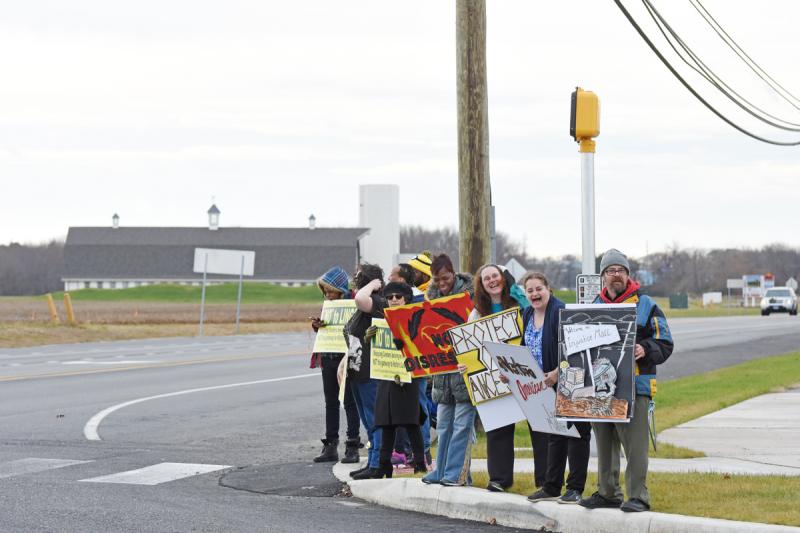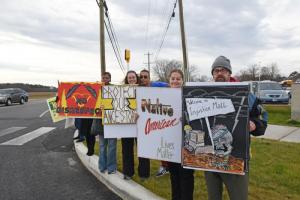About two dozen people stood at the intersection of Kings Highway and Gills Neck Road Dec. 27, to peacefully protest the Gills Neck Village Center project.
Sussex County Council unanimously approved the rezoning of an 11.6-acre parcel across from Cape Henlopen High School from AR-1, agricultural-residential, to B-1, neighborhood business district, at its Dec. 13 meeting, allowing developer J.G. Townsend Jr. & Co. to build a shopping center of up to 75,000 square feet on the property.
Protesters included people of Native American descent concerned about the disturbance of unmarked burial grounds on the site and Lewes-area residents voicing continued concern about the shopping center’s impact on Lewes’ wellheads, located across Kings Highway from the Village Center site, and increased traffic caused by the development of the shopping center.
“We’re here as protectors, not protesters,” said Jules Jackson, an advocate of indigenous peoples’ rights.
Co-organizer Aaron Appling said the Village Center property is recognized on the National Register of Historical Places as the Townsend site, home to Lenape tribe burial grounds. And while he knows the developer now has the legal right to move forward with the project, he’d like to see more done to protect the possible presence of unmarked burial grounds.
“We’re peaceful, but we want people to start talking about this,” he said. “Our main objective is to start a conversation.”
He added: “Money speaks in our country - that’s just a fact, and [the developer] has a lot more than we do.”
Appling was part of a small group that also protested outside the Sussex County Administration Building on The Circle in Georgetown Dec. 13, when county council made its decision on rezoning.
Parcels along Gills Neck Road have a long archeological history. There have been significant archeological finds on Townsend-owned properties over the past 60 years.
One was so significant back in the 1950s that the renowned Smithsonian Institution had 50 Native American remains removed from the property. The remains are at the National Museum of American History in Washington, D.C.
Jackson said the state needs to improve its unmarked remains law as it relates to projects like Village Center. She said the developer has indicated that it will consult an archaeologist as needed.
“We’re saying ‘as needed’ is not acceptable - it’s not enough,” she said.
She said elected officials need to be held accountable for their decisions.
“We put them in office, and they work for us,” she said. “The public was overwhelmingly against this project. What’s the point of public input if you’re not going to listen to it?”
Jackson said she was proud to see such a diverse group of people at the event. She said no matter political alliances, people can come together to do what’s right.
“We really want to unite and change the dialogue in terms of being inclusive and representing all Americans,” she said. “Every background is represented here, and we’ve all come together for good.”
In addition to Lewes residents, Lewes Mayor and City Council and Board of Public Works each asked county officials to strongly consider the impact of Village Center on the city’s water, as the site sits within its groundwater recharge area.
J.G. Townsend Jr. & Co. must now submit a site plan for review to the county's planning and zoning commission. Among other compliance features, the plan must show how the project will comply with the county's source water protection ordinance.
According to its website, the goal of the Gills Neck Village Center component is to reduce the use of cars and promote a green, healthy lifestyle for the residents of Gills Neck Road, by providing walkable access to everyday necessities and services.

























































